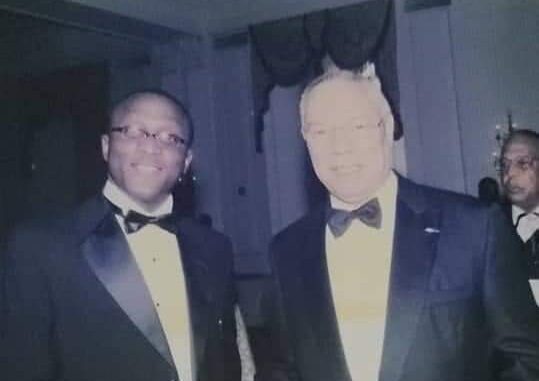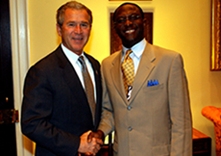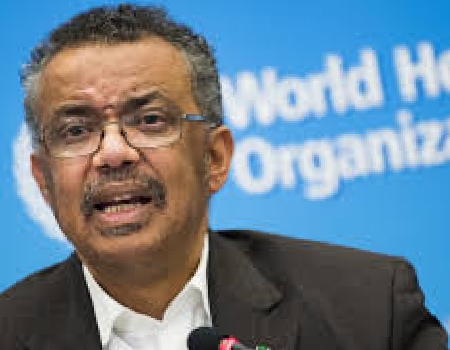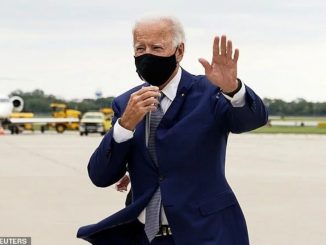
On Monday, October 18, 2021, news broke out that the former US Secretary of State, Colin Powell, died of Covid-19 complications at 84 years of age, his family said in a statement.

Powell, the son of Jamaican immigrants, who rose to become the first Black US Secretary of State, the highest America’s diplomatic office, and top military officer, had formerly served three Republican Presidents in senior posts and ascended to leadership of the US military as it was regaining its vigor after the trauma of the war in Vietnam, where he served two tours as an Army officer.
Earlier in Powell’s active days as US Secretary of State, Laolu Akande, a celebrated and award-winning Nigerian journalist, editor, scholar, had engaged the former US diplomat at the United Nations, in a session he described as “a lucid evidence of the civility of America’s number one diplomat.”
Recalled Akande, currently a Senior Special Assistant to the President on Media and Publicity, Office of the Vice President, turned to be the first African journalist to interview a sitting US President in the White House, after his exclusive question and answer session with former President George W. Bush.

Apart from Bush and Powell, Akande, who, as a foreign journalist became the longest-serving African correspondent at the United Nations, during his successful journalism career had also interviewed US billionaires like Microsoft founder, Bill Gates and Donald Trump, who later emerged the US President (on January 20, 2017 and ended on January 20, 2021), among other prominent people in Africa and globally.
Akande’s experience with Powell is reproduced below in this article published by Nigeria World, in his column titled: ‘Laolu Akande’s Journal,‘ on Monday, February 16, 2004, as a tributary to the fallen America hero.
—
A Date With Colin Powell On The Day He Returns To The UN
I think Colin Powell is a gentleman.
But just a week after I interviewed Colin Powell, he went to the US Congress to testify as is statutory, on the activities of his Department in front of the House of Representatives Foreign Relations Committee.
In the course of his exchange with a member of the committee, a democrat put a question to Powell and in coining that question referred to President George W. Bush’s military record. The Congressman actually said the President went AWOL.
This clearly irked Colin Powell, even though the Congressman had paid tribute to him as a general comparing him to Bush and Cheney, both of whom military service, the congressman apparently disdained, at least so Powell must have felt.
As Powell took turn to respond he told the Congressman that he did not know what he was saying and described the congressman’s remarks about the president’s military record “a political fight”. It was a touchy moment at the hearing and before too long the news cable channels started running the exchange on TV, describing Powell as engaging in a testy exchange at the hearing. Many TV pundits have since then rained criticisms on Powell for that episode at the Congress.
Well, I interviewed Powell about a week earlier and I can say at least one of the questions I put to him was on a controversial topic, but the retired US general answered respectfully.
Interviewing American’s top diplomat at the UN headquarters was a bit hectic. I am convinced that had the interview been held at Powell’s base either in Washington DC or New York, it would have been far less frantic if at all.
To start with, those of us 4 reporters who were invited for the exclusive sit-down interview with Powell were caught in between two levels of security and protocol impositions. While the Americans who invited us at some point asked me to wait in the lobby while Powell was finishing another diplomatic assignment just before the interview, UN security officials soon walked to me insisting that I could not wait at the lobby since I am a journalist. They asked me to leave and join the other UN based reporters, who were “caged” at the end of the lobby for a press stakeout for Kofi Anan, Powell and other newsmakers at the UN.
I tried to explain that I came for a special interview with Powell and his American aides asked me to wait. Perhaps, a mild turf battle ensued but I found myself joining the crowd of reporters who were enclosed inside a railing used to demarcate their space at the end of the lobby. The three other reporters joined me there as they arrived.
But the Americans were very cordial and made sure that we did not miss our appointment with the Secretary of State. It was while we were there with the other group of reporters numbering about 40 that Powell and Nigeria’s Foreign Affairs Minister Ambassador Oluyemi Adeniji showed up for a photo-op. Both gentlemen had just completed a brief bilateral meeting at the end of the Liberia donors’ conference for which Powell, Adeniji, Liberian president and other world leaders were at the UN.
Before Powell and Adeniji appeared at the press “joint,” one of Powell aides had asked the reporters not to bother to ask Powell any questions when he comes with Adeniji as that would simply be a photo-opportunity. But he assured them that soon after, Powell would reappear with Liberian interim leader Charles Gyude Bryant and then would take questions.
ALSO READ: Osinbajo is a man to follow, says Nigeria’s VP’s Spokesman Akande
So Powell came with Adeniji. He greeted the journalists, many of whom had shown up at the UN on that day knowing full well that he would be there. Nigeria’s Adeniji, himself a well regarded diplomat of international standing smiled beside Powell and the two shook hands in front of snapping cameras after which Adeniji left waving bye. Powell then left, perhaps to commence another bilateral with Liberia’s new leader.
Some minutes later Powell returned to the press “stakeout” with the new Liberian leader and then took questions after both leaders addressed the press.
At first I did not bother to pose any question at the press stakeout since I was going to have what is close to an exclusive later. Besides, I was taken in by the aggressiveness with which the UN ‘veteran correspondents” struggled to get the turn for a question.
But when it was clear that all the questions were being directed only to Powell and none to the Liberian leader, who is actually the sitting president of his country, I tried to raise a question only to find out that I was standing in the fringes of the press stakeout and there was no way I would be called where I was standing. I could not even move closer to the center, which was crowded. A reporter later told me that there was such a crowd at the press stakeout because reporters knew Powell was coming to the UN.
And as I became a spectator in the whole drama, I saw Kofi Anan standing silently in a corner of the lobby with his aides around him. Anan himself had to wait for Powell to finish his interaction with the reporters before he took his turn.
It was while Anan was addressing the press that the four of us, Suzy Price of BBC, Celia DeLaVarene of Radio France International, Marc Carnegie of AFP and yours truly were taken away to set up inside the room where our interview with Powell would take place. No sooner we took our seats; Powell walked in with few of his aides including the charming Emily J. Miller, the deputy press secretary of the State Department.
The African American of exemplary records who many had prayed and hoped would run for president before he accepted to be Bush’s Secretary of State was graceful yet stately as he shook hands and took his seat in a room that had altogether about 8 people including his aides. We all sat around the same table. Powell and I were the only black persons in the room!
To be sure, Powell himself was a guest at the UN, and he was returning to the UN building after a bitter diplomatic feud had ensued last year, regarding America’s insistence to go to war in Iraq, although much of the UN member nations and the Security Council would have preferred a different approach to the Iraqi question.
Many still remember how Powell came to address the Security Council with some proof that Iraq possesses Weapons of Mass Destruction, WMD. There are still several diplomats who say it was Powell’s delivery that made them change their attitude and gave America the benefit of the doubt.
Of course that did not include Powell’s French colleague, who stood firmly against America’s quest to get the UN to rubber stamp its war agenda via a UN resolution. So Powell was returning to the UN after that sour diplomatic event. Interestingly Powell had lunch in New York with his French counterpart that afternoon!
For our roundtable, we could only talk about Africa, and aides had asked us to submit likely issues we wanted to raise, so the secretary would be briefed ahead. Powell made no opening statements, and looked like his own man. But perhaps due to his aides prepping of him, there was no such thing as ‘no comment’.
When I asked him about Halliburton, he wasn’t quite sure I used the word cheated in referring to the US oil service company and he sought clarification. I provided him a positive response and I think he managed to strike a balance saying the US would not condone bad behaviors on its companies part and also on the part of the host countries.
But I found him to be less forthcoming on NEPAD, or perhaps he was, and the US by extension taking a wait and see attitude. Before I asked Powell the question on NEPAD, I had weeks ago asked the same question from another State department official, who simply apologised that he didn’t know enough-if at all- to offer any form of response.
I was keen on the NEPAD question simply because a lot of store had been made about NEPAD being an imposition from G8 leaders. If the informal leader of G8-the US-is not as enthusiastic about NEPAD as I found out, NEPAD should then not be written off as a plan imposed from outside.
But the other side of the coin is for African leaders, like our own Olusegun Obasanjo, Thabo Mbeki and Abdou Laye Wade to ask themselves how much they really should expect from G8 leaders in trying to turn the great vision of NEPAD to reality. It also means the job of the true promoters of NEPAD is well cut out for them.
Yet one must say Powell’s brief response to the question on NEPAD expressing the support of the US is nonetheless good for Africa, especially when you juxtapose for instance NEPAD’s Peer Review Mechanism with his comments on the US Millenium Challenge Account.
Powell had said: “Corruption destroys democracy. You cannot have a democracy if the people see that their money is thrown away. And one important tool we’re going to have is the new Millennium Challenge Account. Everybody now wants to be in line to receive money from the Millennium Challenge Account.”
He went on: “I’m going to have a billion dollars this year, and every year it’s going to go up so that when it’s fully funded — in about three years, I think it is — $5 billion every year will be available. And guess what? You don’t have the rule of law, you can’t convince us that you are running your country in a non-corrupt manner, or you are throwing the media in jail, or you are not allowing companies to operate openly and freely and with some expectation that their property and their investment will be protected, you won’t be eligible.”
That sounds to me as something related to NEPAD’s Peer Review.
In all Powell, a most admired folk figure both in the US and abroad, gave us little less than 30 minutes. But he answered every question and you could not but appreciate his grasp of the issues. He was very business-like and those who say he is one of the doves in President Bush’s cabinet must be correct. Seeing him standing blandly in front of a partly foreign press stakeout, with his hands at his back and responding to compliments from some reporters is a lucid evidence of the civility of America’s number one diplomat. May we see more of him.




